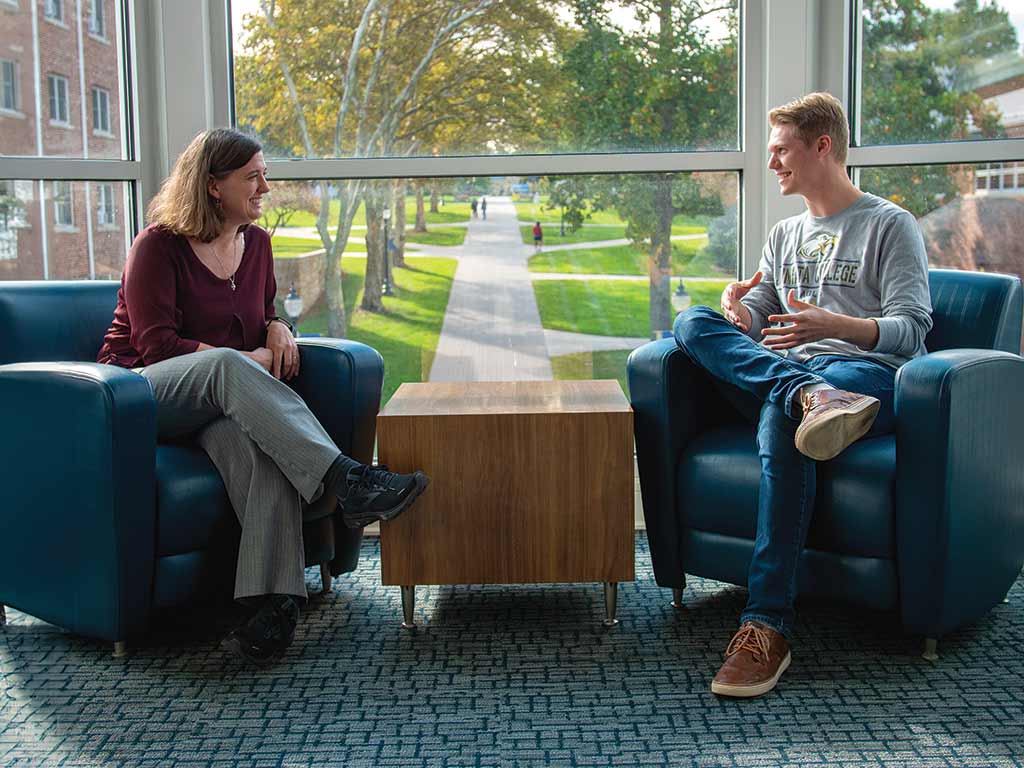Kristin Camenga considers herself a planner, so when her undergraduate adviser took her aside after her first year at St. Olaf College and asked her if she had considered graduate school to teach at the collegiate level, she was slightly unnerved. Sticking to her plan, she graduated and taught high school math; however, her adviser’s words stuck with her, and two years later, she enrolled in graduate school at Cornell University and then taught at Houghton College and later Penn State Altoona. In 2016, she joined the mathematics department at Juniata College. In a full circle moment, Camenga—who was influenced by her own adviser—is now the director of advising at Juniata.
When asked why she pursued the advising position, Camenga says, “I love students, and I love advising them. The advising system was already great, but there wasn’t really any organized training. When I do something and I’m passionate about it, I want to share what I know with others, and I want to make it better.” She adds that while she has a knack for administrative duties, she did not want to give up teaching, so the director of advising job allows her to give back to students while remaining in the classroom.
Her experience as a Fulbright Fellow in Budapest, Hungary, serves as another way to connect with students and inspire them on the possibilities beyond Juniata. She is one of many faculty focused on increasing the number of students pursuing Fulbright Fellowships and other prestigious programs.
“We want to provide every possible support for our students,” says Camenga. “The approach at Juniata is very personalized. Our tagline is ‘Think about who you are,’ so we are always looking to help students find their path forward.”
Camenga, who has two daughters with her husband Andrew, a pastor, says that she fell in love with math due to her parents; her mom was a math teacher and her father studied physics and math in college.
As passionate as she is about math—”I love the order, structure and the logic to it and find it very creative”—she truly loves her advising role and the uniquely Juniata approach to advising.
“The two-adviser system allows two different individuals to see two different sides of each student,” says Camenga, who notes that at Juniata, students are assigned a program of emphasis adviser once they enroll, and then choose their secondary adviser.
Camenga conducts peer training for advisers and notes that faculty members typically become advisers after their first year of teaching.
“We have an Adviser Boot Camp that’s aimed at new advisers, but it’s open to first-year faculty members who may be advisers next year. The morning session is open to all advisers, while the afternoon session is geared toward new advisers and covers such areas as what computer programs you will use,” Camenga says.
She offers ongoing advising development by taking other advisers to conferences including national conferences held by the National Academic Advising Association (NACADA). “We also create professional development seminars as needs arise to hone skills, such as a recent one on writing recommendation letters,” she says.
Juniata College’s advising approach is designed to serve the needs of all students.
“We ask ourselves, ‘How can we best relate to our BIPOC (Black, Indigenous and People of Color), international, and LGBTQ students?’ What are some of the issues that resonate with them? It’s all about reaching every student,” Camenga says.
Camenga was the 2020 recipient of the Gibbel Award for Teaching Excellence, and she notes that one of the perks of this award is giving the opening convocation to incoming students, but because of COVID-19, hers had to be done via video. With this in mind, she framed her speech on what it was going to take to be a community in that environment. “When you are wearing a mask, it’s harder to get to know someone, so I urged them to invest more time in building relationships, which takes courage,” she recalls.
As she looks at what’s next with advising, Camenga says she is focused on creating a more open sharing system to allow faculty and advisers to collaborate and share knowledge. “It’s about making sure that we all have enough background knowledge so that we can be the best adviser for students that we can.”





